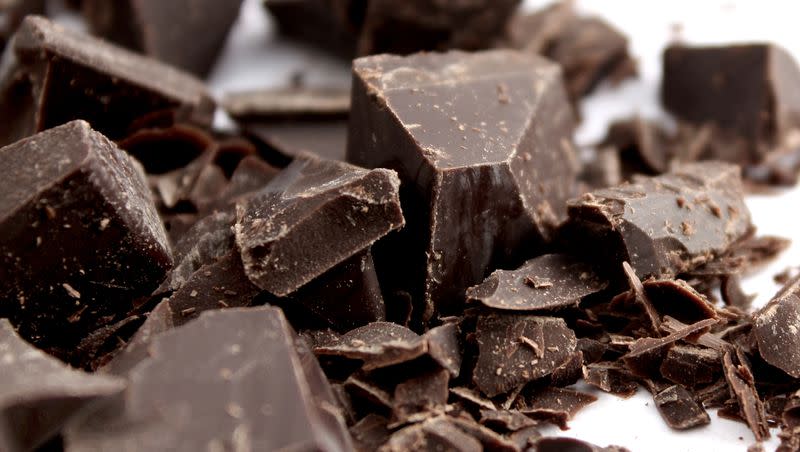5 physical and mental health benefits of dark chocolate

Eating dark chocolate for your health may sound counterintuitive, but it is actually a superfood packed with nutrients and health benefits such as easing symptoms of depression and reducing risk of heart disease.
Let’s take a look at five physical and mental health benefits of dark chocolate.
Related
What defines a superfood?
Dark chocolate is widely considered to be a superfood, as reported by the Deseret News.
Superfoods are a category of foods that are rich with nutrients such as antioxidants, minerals and vitamins. They are often also packed with fiber, protein and healthy fats.
“Superfoods help promote health by increasing your immune function and decreasing your chance of disease prevention or progression,” registered dietitian Beth Czerwony told the Cleveland Health Clinic.
1. Dark chocolate is packed with nutrients
Dark chocolate may be traditionally considered a dessert food, but it is actually packed with nutrients. Dark chocolate is rich in flavanols, a type of flavonoid that benefits the heart, helps with cell rebuilding and can help lower blood pressure, per Cleveland Health Clinic.
It is also rich with minerals, such as iron, magnesium, zinc, copper and phosphorus, per Healthline. With 11 grams of fiber per serving, dark chocolate is also an excellent source of fiber.
Dark chocolate is also often considered to be dairy-free, which makes it a good treat option for those maintaining a dairy-free diet.
Related
2. Dark chocolate may reduce heart disease risk
Regularly eating high flavanol cocoa or dark chocolate can lower blood pressure and improve cardiovascular health, a 2017 study found.
A 2019 review of several studies suggested that consuming 45 grams of chocolate each week lowers risk of cardiovascular disease by 11%. Eating more than 100 grams of chocolate each week was not associated with the same health benefits due to a higher sugar consumption.
Another review of studies found that consuming dark chocolate three times every week lowered cardiovascular disease risk by 9%.
Research “suggests that chocolate consumption confers reduced risks of CHD (coronary heart disease), stroke, and diabetes,” the study review claims. “Consuming chocolate in moderation (1–6 servings/week) may be optimal for the prevention of these burdensome diseases.”
3. Dark chocolate can prevent depressive symptoms
Dark chocolate is usually considered a treat, but it actually has loads of health benefits. It is packed with fiber, iron, magnesium and antioxidants. Dark chocolate can also help prevent symptoms of depression.
Dark chocolate is also associated with positive effects on mood and mental health. A 2019 study from the University College in London found that individuals who ate dark chocolate had far lower odds of reporting depressive symptoms than those who ate no chocolate at all. The same impact was not found for milk chocolate, per the American Psychiatric Association.
“Polyphenols are antioxidants that lower cortisol, a stress hormone,” dietitian Devon Peart told Cleveland Health Clinic. “So there are mood-enhancing benefits to eating dark chocolate.”
A 2022 study found that adults who ate 85% cocoa chocolate daily maintained a better mood than individuals who ate chocolate with lower cocoa content or no chocolate at all.
Related
4. Dark chocolate may protect your skin from sun damage
Protection from sun damage is another benefit dark chocolate offers. The antioxidants found in dark chocolate may increase blood flow to your skin and help protect it from sun damage, according to a 2021 study. The flavanols in dark chocolate can increase skin density and hydration.
A small 2009 study found regularly eating chocolate high in flavanols was linked to significant skin protection from ultraviolet damage. Milk chocolate did not have an impact on sun protection.
5. Dark chocolate could improve brain function
Dark chocolate may improve brain function. Consuming high flavanol cocoa is associated with improved attention, memory and verbal attention, according to Healthline.
A 2020 study found that eating high flavanol cocoa (70% dark chocolate or higher) can increase cognitive function and neuroplasticity in young adults. Dark chocolate could also be considered a preventative to neurodegenerative diseases and cognitive decline, the researchers found.
“Short and middle-term effects of daily cocoa intake may provide young adults with a better cognitive performance in verbal learning, memory, and attention favoring academic achievement,” reports the study.
Research is limited, but a 2019 study found that cocoa flavanoids could help maintain cognitive function in older adults suffering from mild cognitive impairment and limit the risk of progressing to dementia.
